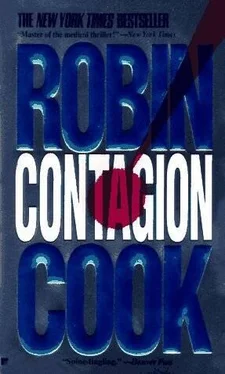Robin Cook - Contagion
Здесь есть возможность читать онлайн «Robin Cook - Contagion» весь текст электронной книги совершенно бесплатно (целиком полную версию без сокращений). В некоторых случаях можно слушать аудио, скачать через торрент в формате fb2 и присутствует краткое содержание. Жанр: Триллер, на английском языке. Описание произведения, (предисловие) а так же отзывы посетителей доступны на портале библиотеки ЛибКат.
- Название:Contagion
- Автор:
- Жанр:
- Год:неизвестен
- ISBN:нет данных
- Рейтинг книги:3 / 5. Голосов: 1
-
Избранное:Добавить в избранное
- Отзывы:
-
Ваша оценка:
Contagion: краткое содержание, описание и аннотация
Предлагаем к чтению аннотацию, описание, краткое содержание или предисловие (зависит от того, что написал сам автор книги «Contagion»). Если вы не нашли необходимую информацию о книге — напишите в комментариях, мы постараемся отыскать её.
Amazon.com Review
When not one but three different extremely rare diseases kill several patients at a New York hospital, forensic pathologist Jack Stapleton suspects it's more than just coincidence. He thinks there's a connection between the appearance of the mysterious microbes responsible for the deaths and the HMO that owns the hospital-the same HMO that once destroyed his flourishing medical practice. Is Americare deliberately killing off its sickest patients-those who cost the most money to treat? Or is there an even more sinister motive behind the strange goings-on at Manhattan General, not to mention the attempts on Jack's life? And what is beautiful Terese Hagen, the hard-driving creative director of a Madison Avenue ad agency, doing in the middle of this slightly muddled, but still engrossing, tale of greed, medicine, and mayhem? Like Michael Crichton, whose Andromeda Strain remains the classic in the genre, Cook is sometimes heavy-handed when it comes to character development, and his fulminations about the dangers of managed care often get in the way of the plot. Still, Contagion will make you think twice about taking your next case of flu to the ER instead of your own bed. -Jane Adams
From Library Journal
In Cook's numerous best-selling medical thrillers, the nasty microbes and lethal diseases are never as loathsome as the greedy villains who spread illness for profit. Here, a cynical forensics doctor suspects that a for-profit medical firm is murdering its more costly subscribers. A Literary GuildR main selection.
When not one but three different extremely rare diseases kill several patients at a New York hospital, forensic pathologist Jack Stapleton suspects it's more than just coincidence. He thinks there's a connection between the appearance of the mysterious microbes responsible for the deaths and the HMO that owns the hospital-the same HMO that once destroyed his flourishing medical practice. Is Americare deliberately killing off its sickest patients-those who cost the most money to treat? Or is there an even more sinister motive behind the strange goings-on at Manhattan General, not to mention the attempts on Jack's life? And what is beautiful Terese Hagen, the hard-driving creative director of a Madison Avenue ad agency, doing in the middle of this slightly muddled, but still engrossing, tale of greed, medicine, and mayhem? Like Michael Crichton, whose Andromeda Strain remains the classic in the genre, Cook is sometimes heavy-handed when it comes to character development, and his fulminations about the dangers of managed care often get in the way of the plot. Still, Contagion will make you think twice about taking your next case of flu to the ER instead of your own bed. -Jane Adams
From Library Journal
In Cook's numerous best-selling medical thrillers, the nasty microbes and lethal diseases are never as loathsome as the greedy villains who spread illness for profit. Here, a cynical forensics doctor suspects that a for-profit medical firm is murdering its more costly subscribers. A Literary GuildR main selection.












